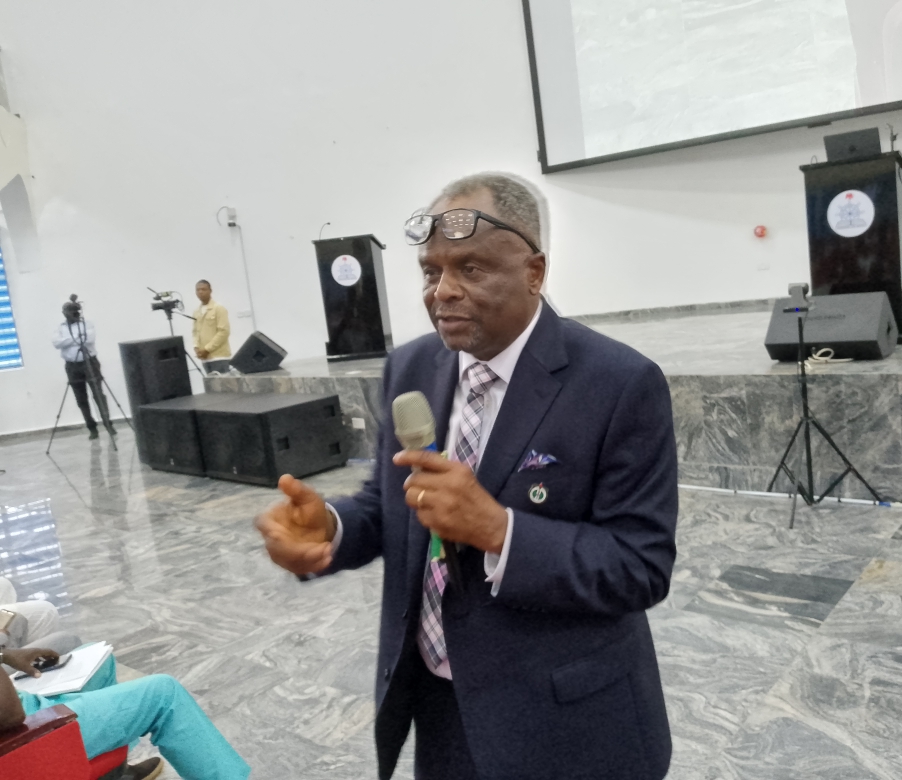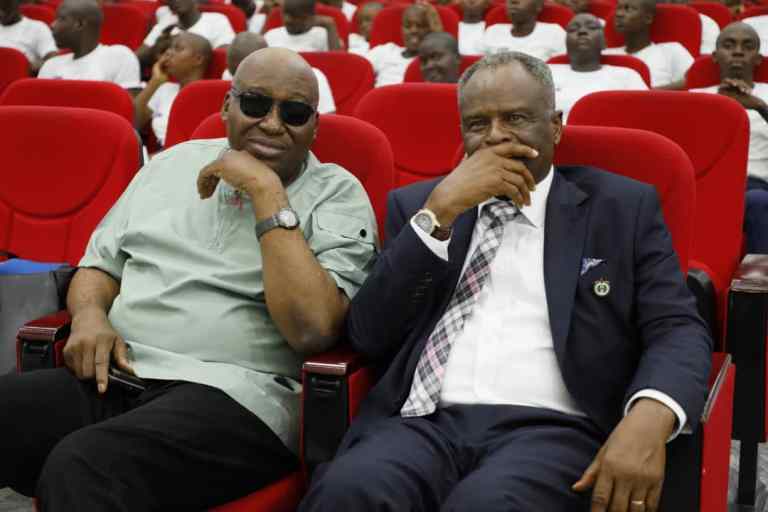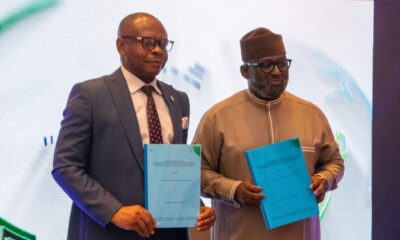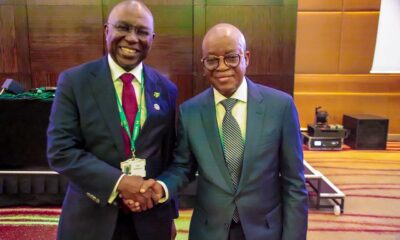Shipping
‘Nigeria Largest Ship Owing Country In Africa’ – Rear Admiral Akpan

BY EGUONO ODJEGBA
Efforts to sustain current drive in unfolding the nation’s blue economy has raised greater consciousness about her maritime potential as Nigeria has been listed as the number one leading ship owing country in Africa.

MAN Rector Cdre DE Effedua and Rear Admiral Akpan during the 2024 Blue Economy Week
Disclosing above during the 2024 Blue Economy Week organized by the Maritime Academy of Nigeria, MAN, Oron for its cadets recently, Rear Admiral FD Akpan Rtd, informed that Nigeria holds the 33rd position in global merchant shipping.
“Nigeria is the largest ship owning country in Africa. In terms of the World’s Fleet, Nigeria is at the 33rd position with 291 vessels totaling 7.94 million dead weight tons. In terms of vessel value, Nigeria owned ship/ vessels are at 30th place with 0.56% (less than 1%) of the total world fleet value.”
The retired naval chief said that with the right attitude and functional deliberate policies in place, Nigeria’s participation in the global blue economy will translate into great economic opportunity for the people and government.
For optimal performance, he called on the federal government to implement the Cabotage Law that has lain prostrate since inception by providing for effective template and national participation through honest and purposeful engagement; especially in the area of raising indigenous shipping capacity.
“Maritime transport activities in Nigeria account for 1.89% of GDP as at 2022. The maritime sector is expected to contribute about 20% of the GDP. According to United Nations Conference on Trade and Development, UNTAD, global shipping container transportation alone accounts for USD $9.5 Billion in 2021, projected to a value of USD $15.3 Billion in 2027.
“The present state of affairs can be attributed to the low vessel ownership, the domination of import trade over export and the non-implementation of the Cabotage Act among other factors. These challenges cannot be sustained, must reform with Nigeria’s growing population.
“The support and the implementation of the Cabotage Act will enhance investment in the national shipping fleet to meet with the expansion of global maritime trade.”
While lamenting that Nigeria’s local fleet and the maritime workforce cannot improve on the projected GDP and tap into the Global Maritime Trade financial aggregates, he urged the authorities to march their words and promises with practical steps aimed at raising the stakes.

“The Minister for Marine and Blue Economy has promised a review of the “Draft Strategy Document for the Marine and Blue Economy Sector” in order to harmonize governance structure, with the plans of action for promoting the Blue Economy development initiatives. According to the Hon Minister, “the blue economy presents significant challenges and promising opportunities for sustainable development”.
“The Ministry of Marine and Blue Economy will need a cluster of other ministries and parastatal of Government to succeed. It will require the sim-less integration of the Ministries of Defence, Police, Agriculture, Culture and Tourism, Finance and Environment, in order to meet with the conceptual challenges of “security, funding, over exploitation of the marine resources, habitat destruction, pollution, climate change, unemployment, and reduction of the impact of the marine ecosystem.
“The lack of a ground breaking strategic policy that will create and legislate the Marine and Blue Economy Initiative is an impediment not just to the future of the paradigm in Nigeria but also in the Continent. Thus is a burden and a challenge!
“The sustainable exploitation of maritime resources, require effective surveillance, monitoring and control systems over the maritime domain for the Blue Economic principles to thrive”, he noted.
While noting security threats associated with piracy, sea robbery, crude oil theft, illegal refineries, illegal unregulated and unreported, IUU, fishing, arms and human trafficking, among others, Akpan said:
“The proliferation of small to medium weapons and assault rifles and excessive gas flaring that has destroyed livelihoods and habitats in the Niger Delta areas” should also be looked into.
“Excessive gas flaring in Nigeria, (the worst in the World) has wreaked havoc over the oil producing areas resulting in “acid rain” with research revealing that life expectancy may be 10 years lesser than other parts of the country.”
He continued: “The establishment of the Ministry of Marine and the Blue Economy is strategic as it will galvanize efforts towards the maximum yields from the country’s rich marine resources as an element of national economic framework.
“To this end, the Ministry must collaborate with the stakeholders and partners, engaging the continental and global platforms to reinvent the processes in Nigeria. With the global target of realizing USD $41.5 Trillion annually by 2030 among other incentives, it must seek to produce a ground breaking strategy and policy with the right structure in order to harness the abundant opportunities available in the Blue Economy regime. We have the knowledge and the wherewithal to produce an enduring policy as the region awaits Nigeria to lead.
In the same vein, he canvassed the necessity of tweaking the current training curriculum by specialized maritime institutions in the country to reflect the imperative of the blue economy regime.
“The newly established universities including the Maritime University Ibusa, the Maritime Academy Oron and others should close the existing gaps of knowledge through curriculum for the Blue Economy, to include Ocean governance, bio-prospecting and marine biotechnology.
“The worldwide market place for marine biotechnology is predicted to exceed USD $5.9 Billion by this year 2023, thus, creating opportunities for more investment and jobs for our teeming population”, he said.





































